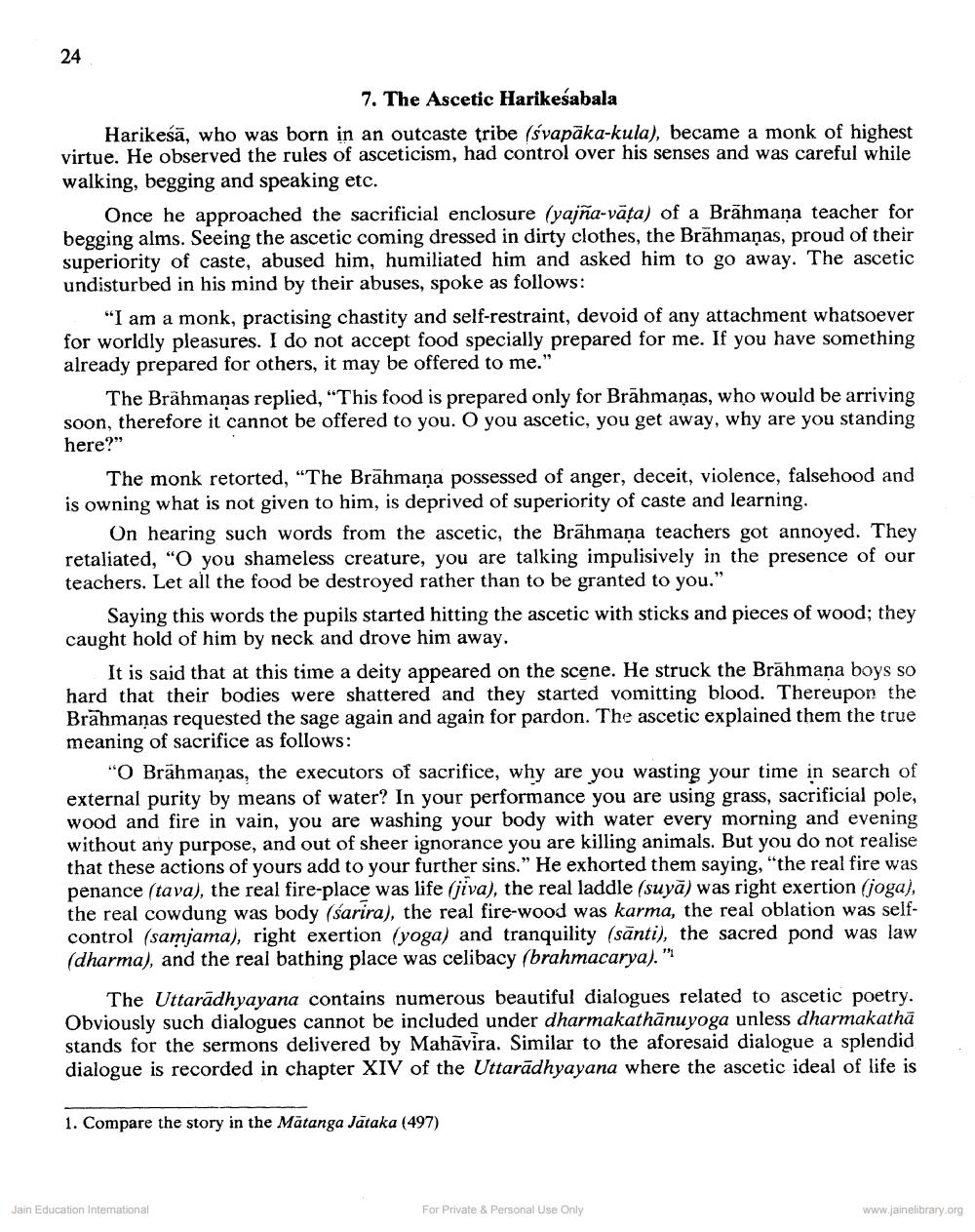________________
7. The Ascetic Harikesabala Harikesā, who was born in an outcaste tribe (svapāka-kula), became a monk of highest virtue. He observed the rules of asceticism, had control over his senses and was careful while walking, begging and speaking etc.
Once he approached the sacrificial enclosure (yajña-vāta) of a Brāhmaṇa teacher for begging alms. Seeing the ascetic coming dressed in dirty clothes, the Brāhmaṇas, proud of their superiority of caste, abused him, humiliated him and asked him to go away. The ascetic undisturbed in his mind by their abuses, spoke as follows:
"I am a monk, practising chastity and self-restraint, devoid of any attachment whatsoever for worldly pleasures. I do not accept food specially prepared for me. If you have something already prepared for others, it may be offered to me."
The Brahmanas replied, "This food is prepared only for Brāhmaṇas, who would be arriving soon, therefore it cannot be offered to you. O you ascetic, you get away, why are you standing here?"
The monk retorted, “The Brāhmaṇa possessed of anger, deceit, violence, falsehood and is owning what is not given to him, is deprived of superiority of caste and learning.
On hearing such words from the ascetic, the Brāhmaṇa teachers got annoyed. They retaliated, “O you shameless creature, you are talking impulisively in the presence of our teachers. Let all the food be destroyed rather than to be granted to you."
Saying this words the pupils started hitting the ascetic with sticks and pieces of wood; they caught hold of him by neck and drove him away.
It is said that at this time a deity appeared on the scene. He struck the Brāhmana boys so hard that their bodies were shattered and they started vomitting blood. Thereupon the Brahmanas requested the sage again and again for pardon. The ascetic explained them the true meaning of sacrifice as follows:
"O Brähmaņas, the executors of sacrifice, why are you wasting your time in search of external purity by means of water? In your performance you are using grass, sacrificial pole, wood and fire in vain, you are washing your body with water every morning and evening without any purpose, and out of sheer ignorance you are killing animals. But you do not realise that these actions of yours add to your further sins." He exhorted them saying, “the real fire was penance (tava), the real fire-place was life (jiva), the real laddle (suya) was right exertion (joga), the real cowdung was body (sarira), the real fire-wood was karma, the real oblation was selfcontrol (samjama), right exertion (yoga) and tranquility (sānti), the sacred pond was law (dharma), and the real bathing place was celibacy (brahmacarya).”
The Uttarādhyayana contains numerous beautiful dialogues related to ascetic poetry. Obviously such dialogues cannot be included under dharmakathānuyoga unless dharmakathā stands for the sermons delivered by Mahavira. Similar to the aforesaid dialogue a splendid dialogue is recorded in chapter XIV of the Uttarādhyayana where the ascetic ideal of life is
1. Compare the story in the Matanga Jätaka (497)
Jain Education International
For Private & Personal Use Only
www.jainelibrary.org




